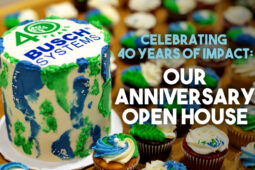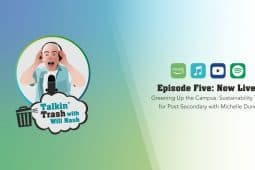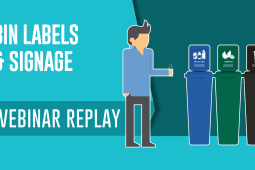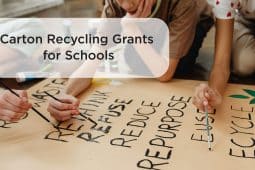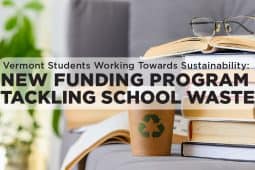13 Best Resources to help Start a Recycling Program at your College/University
For more information & resources on how to build an exceptional recycling program for your college/university, click here.
If you’ve been in campus facilities management or you’ve been a recycling coordinator for a while, then you know waste management on your campus can be a difficult, yet rewarding, task. It’s something that requires daily attention – and the support of informative resources – to drive awareness and nudge habit on your staff & students.
We have written an updated version of this blog that you can read here!
Standardize your program, add more recycling stations, reduce contamination—these are all the typical phrases you’ll hear in the recycling community about how to improve diversion rates and reduce costs on your college campus. These are all successful practices; however, there’s many moving parts to each that makes tackling them successfully a little more difficult—but that’s why they brought you on board!
The team at Busch Systems has put together the following essential list of 12 best resources to help you learn how to run a spectacular recycling & waste management program.
If you know of some more resources that’ll help your fellow recycling coordinators or campus facility managers, please comment below with your suggestions and we’ll add them to the list. And don’t forget to bookmark this page, so you can refer back to it when you’ve got some more time to brush up on your recycling & waste management skills for your college/university.
- Recycling and Beyond: A College Campus Primer [Study]
~120 min read.
This online guide co-authored by world-renowned Recycling Coordinator, Karyn Kaplan of the University of Oregon, provides an overview of strategies for implementation and program development of a college campus recycling program. It provides tools, resources and successes to inspire collegiate recyclers everywhere.
- Tribal Community-Based Social Marketing (CBSM) Recycling Toolkit [Toolkit]
~60 min read.
This toolkit focuses on using the community-based social marketing (CBSM) process to promote recycling behavior, based on a CBSM Case Study at the Fond du Lac Tribal and Community College (FDLTCC).
The toolkit includes example steps of how FDLTCC followed the CBSM process. It also includes a CBSM Strategy Tools Checklist specifically designed to suggest tactics to address barriers to recycling behavior. These toolkit components can be followed step-by-step and tailored towards your own CBSM efforts to promote recycling behaviors. The toolkit components can also be easily adapted to promote any other kinds of positive behaviors!
- EPA Organics Recovery Toolkit [Toolkit]
~45 min read.
EPA recognizes this critical need and views this as a timely opportunity to develop an organics recovery toolkit for colleges and universities. To aid in its development, MMS engaged the University of Louisville’s Center for Environmental Policy and Management (CEPM), part of the Environmental Finance Center Network.
- Zero Waste Campus Toolkit [Toolkit]
~120 min read.
Created by the University of Oregon Zero Waste Program in partnership with CURC, this toolkit contains resources regarding the concept of Zero Waste, Zero Waste management practices and a campus pledge and model policy. This toolkit is also available in a print-friendly version.
- Comparative Analysis of Recycling Programs: A Case Study of
Three Universities [Case Study]
~45 min read.
The goal of this study was to conduct a comparative analysis of three university recycling programs. This study looked at several aspects of the programs that included the diversion rates, per capita ratios of materials recycled and disposed, and the average net costs of waste disposal and waste diversion. The universities included in this study were the University of Nebraska-Lincoln, the University of Colorado at Boulder, and the University of Oregon.
- Virginia Tech “Greening Your Game Day” Recycling Guide [eBook]
~120 min read.
This best practices guide is a resource for colleges and universities to implement or improve collegiate game day recycling and sustainability efforts. The guide was produced by a student research team coordinated by the Virginia Tech Office of Energy & Sustainability. It provides an overview of strategies for the implementation and development of a collegiate game day operation. It includes case studies of participants’ programs and a list of best practices for all areas of game day operations to implement or improve a sustainable materials management program. The guide is published in cooperation with the US EPA’s Game Day Challenge, CURC, Keep America Beautiful and Association for the Advancement of Sustainability in Higher Education (AASHE).
- Toolkit for Soft Drink Contracts [Toolkit]
~60 min read.
Created by Jack DeBell, University of Colorado, Boulder in 2000, this toolkit is designed to help maximize the level of recycling associated with soft drink vending while promoting vendors’ assistance in recycling and waste reduction. The toolkit includes sample bid language, options to address recycling and waste reduction concerns, a cost analysis of converting vending machines from aluminum cans to plastic bottles, and case studies from nine schools around the country.
- Creating and Environmental Coordinator Position Part I: A Portfolio of Case Studies [eBook]
~60 min read.
The goal of this project is to assist those interested in starting new Environmental
Coordinator (EC) positions on their campuses. Included are case studies from colleges and
universities around the country that have established EC positions.
- “Garbage on the Green”- A Waste Audit Event at the University of North Florida [Study]
~45 min read.
This study authored by Stacy E. Wheeler and conducted by University of North Florida provides great walkthrough of the waste assessment process at a college/university. The purpose of the study was to identify and quantify the types and sources of materials in UNF’s solid waste stream. Findings from the study were used to generate new strategies for improving campus waste management and recycling programs. The study was funded by the Environmental Center and supported by the university administration, the city of Jacksonville, and a diverse group of regional public and private organizations.
- Student Evaluations of Recyclable Materials Collections in University-Owned Residence Halls at The Ohio State University [Study]
~60 min read.
This is a great resource for preparation of your own study at your college/university campus. This undergraduate honors project examined recycling knowledge, perceptions, attitudes and behaviors of Ohio State University students living in university residence halls.
- Zero Waste Campus Project [Study]
~100 min read.
If you’re looking for a dense read, this is it! Students at the University of British Columbia walkthrough an incredibly in-depth assessment of their campus waste management program. This research is interested in the infrastructure (i.e. locations of recycling stations) of waste sorting in the University of British Columbia (UBC) Vancouver campus, and how it may affect the rates of waste diversion and recycling. Currently, UBC has 117 traditional garbage bins that do not have any recycling option.
- The Relationship between Education and Behavior among College Freshmen and its Effect on Campus Recycling Rates [Study]
~100 min read.
Abstract: Several campuses have determined that their recycling resources aren’t being used efficiently. Students are often confused about what and how to recycle, resulting in either poor recycling behavior or refusal to recycle all together. Consequently, recycling education programs have been used to increase recycling rates. The University of Wisconsin-Stout has a unique opportunity to test the effectiveness of recycling education because there is a Freshman
Orientation initiative.
- Best universities for recycling and sustainability [Article]
~80 min read.
This article provides a chart of the top 100 universities championing responsible consumption and production in the new Times Higher Education University Impact Rankings. If you’re college/university isn’t on there now, it sure will be soon!
And there you have it! Plenty of resources to get your journey to sustainable waste management started. We’ll continue to update this page as we see more great information come down the pipe. And again, if you think we’ve missed some more resources, feel free to comment below.
Stay tuned!




